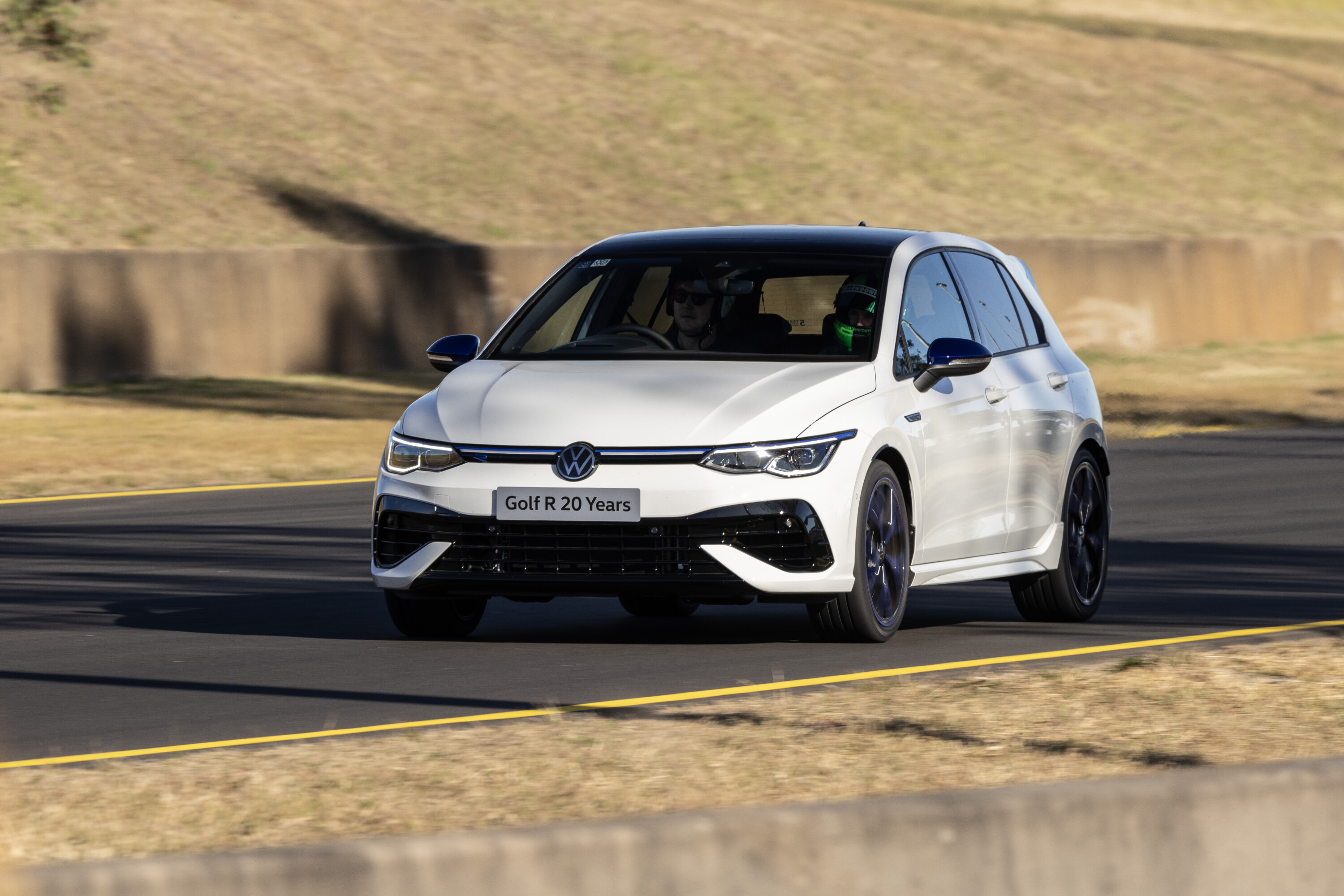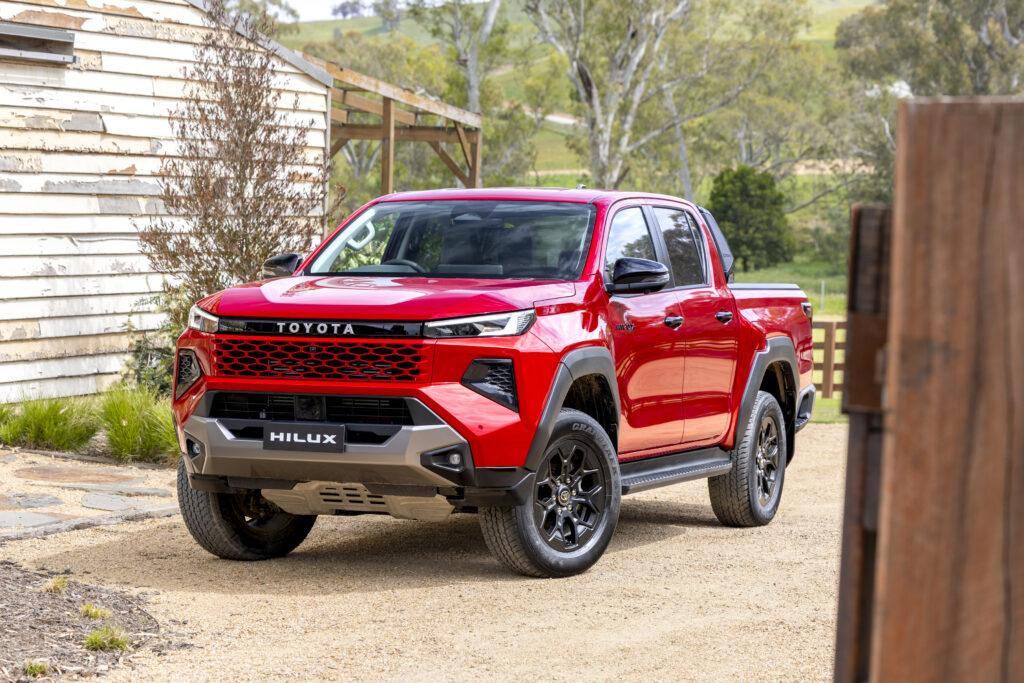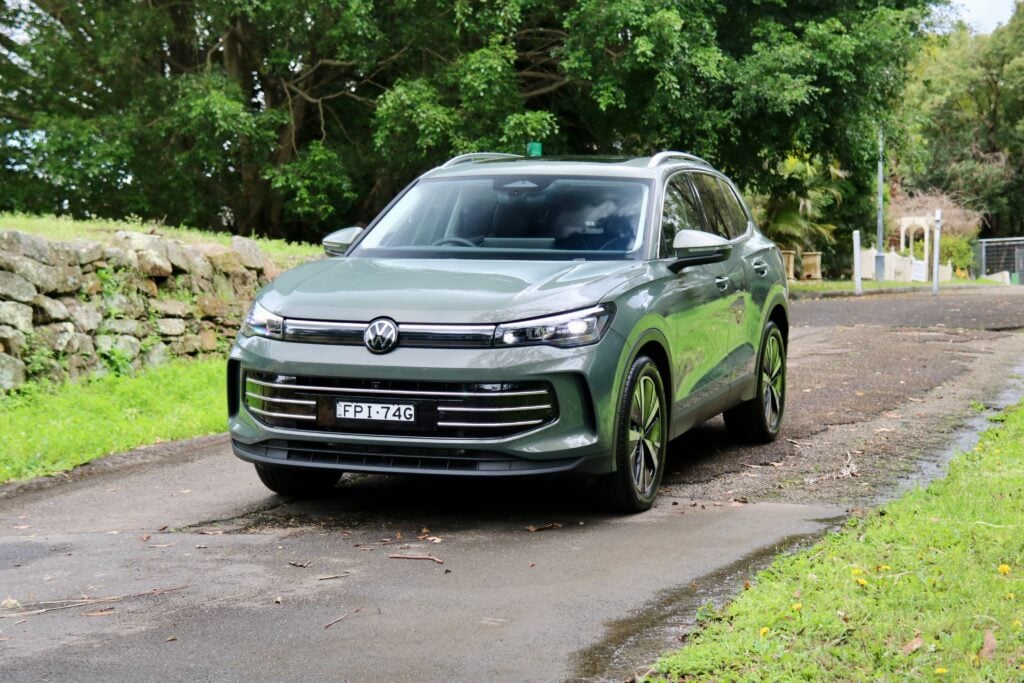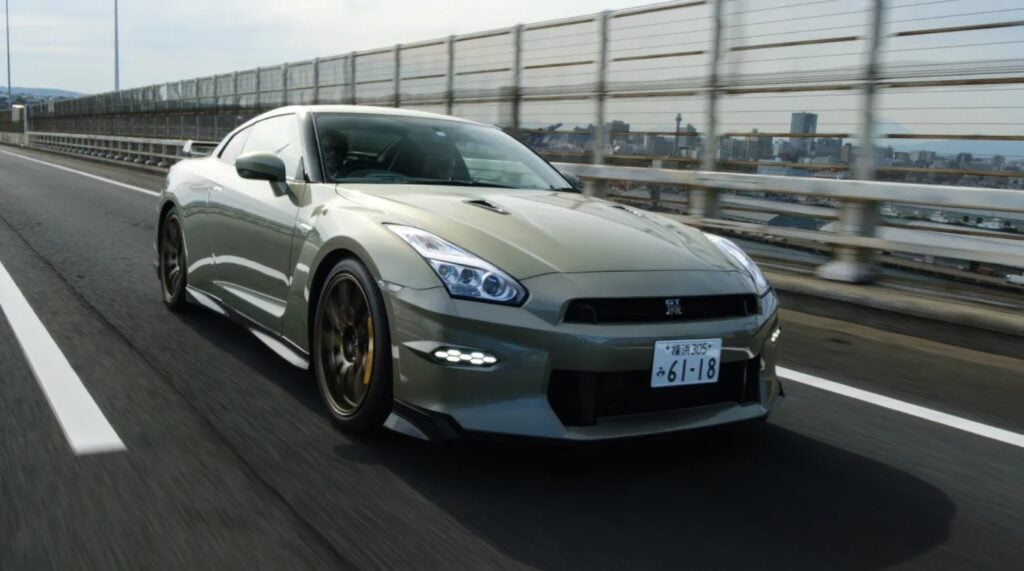Score breakdown
Things we like
- Akrapovic exhaust and punchy shifts
- Trick clutch-pack rear diff
- Unflappable chassis
- Impressive at the local cars and coffee
Not so much
- Capacitive touch wheel buttons
- Could do with stickier tyres
- They’re probably sold out
Volkswagen is celebrating 20 years of R in style with the fastest Golf yet.
Since the Mark 4 R32‘s release, (it was 2003 by the time it hit Aussie shores) R has introduced plenty of innovations, starting with the pioneering six-speed dual-clutch ‘DSG’ transmission still in use today – quite literally, in the Polo GTI’s case.
The latest Mark 8 R is by far the most engaging of the breed, thanks to a torque-splitting rear differential that took the Golf R from anodyne express to enthusiastic drift machine.
JUMP AHEAD
- How much is it, and what do you get?
- Interior comfort, space, and storage
- What is it like to drive on track?
- VERDICT
- Specifications
How much is it, and what do you get?
To honour the lineage, all 50 examples of the R 20 Years wear (some) iconic Lapiz Blue paint.
Going for a blue car gets it all over, naturally, while the 18 white examples (like the one you see here) get Lapiz Blue mirror caps, R badging, accented 19-inch ‘Estoril’ alloys, headlight inserts and cabin details.
Making it more than just a sticker pack, VW engineers have fiddled with the ‘EA888’ 2.0-litre turbo-petrol, adding higher pressure injectors and a titanium Akrapovic exhaust for 245kW and 420Nm – up 10kW and 20Nm from the regular hatch. There’s also an ‘anti-lag’ system that improves response by keeping the turbo spooled for a short period after coming off throttle.
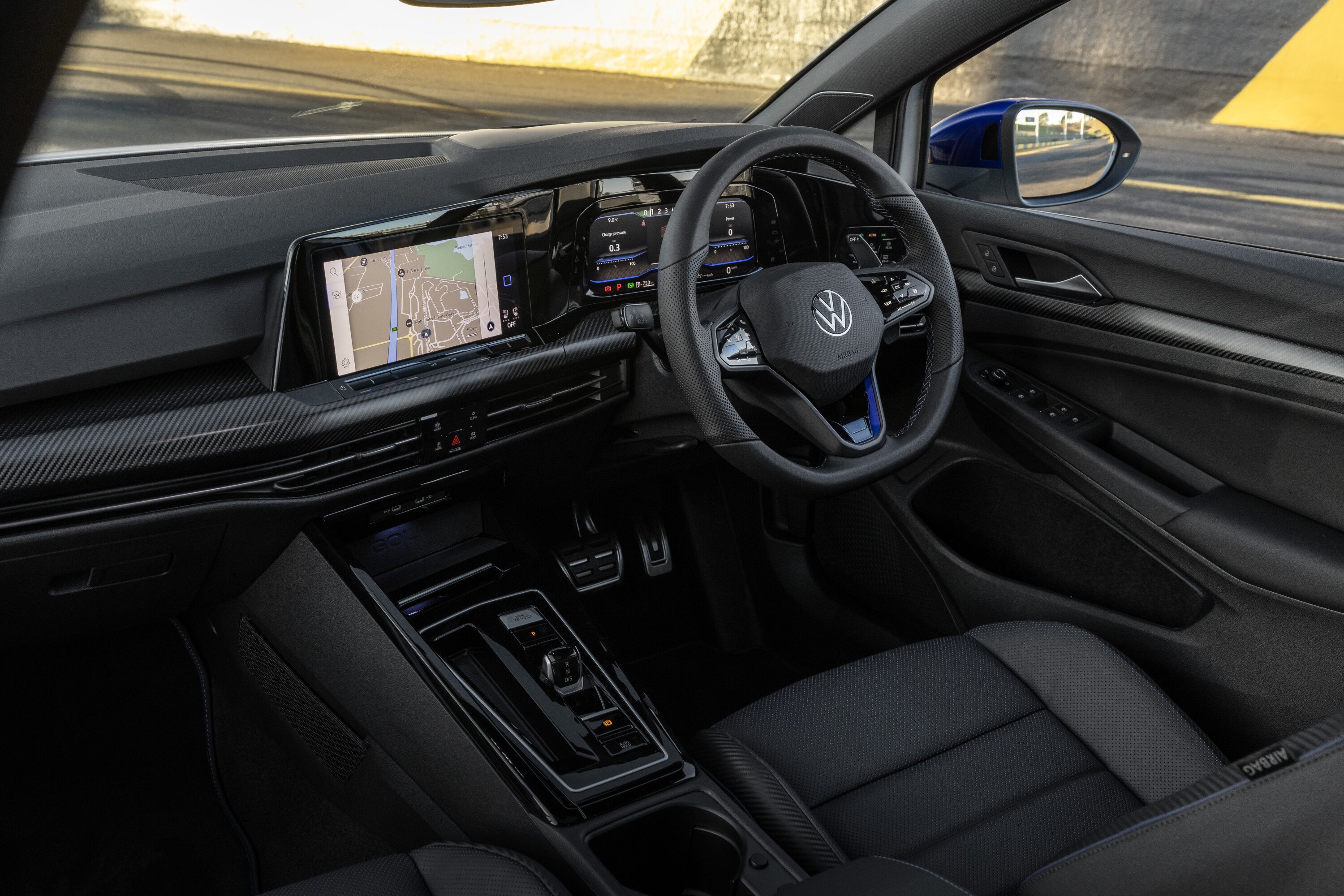
Aside from performance credentials, the R 20 Years gets a petrol particulate filter (just like the R wagon) dropping ADR consumption from 7.8L/100km to 7.3L/100km.
While it’s more than an appearance treatment, it’s no stripped-out track special. The R 20 Years has all five seats, leather upholstery, heated and power-adjustable front buckets, a kick-arse Harman Kardon sound system, real carbon-fibre trim and a panoramic glass sunroof.
The price? It’s $77,490 before on-road costs, a $10,500 premium over the regular Golf R. But in 2003, an R32 would have set you back $63,000 – over $100K in today’s cash – so maybe it isn’t such bad value.
Plus, the sad truth is that by the time you’re reading this review, you’ve probably missed out on getting an allocation.
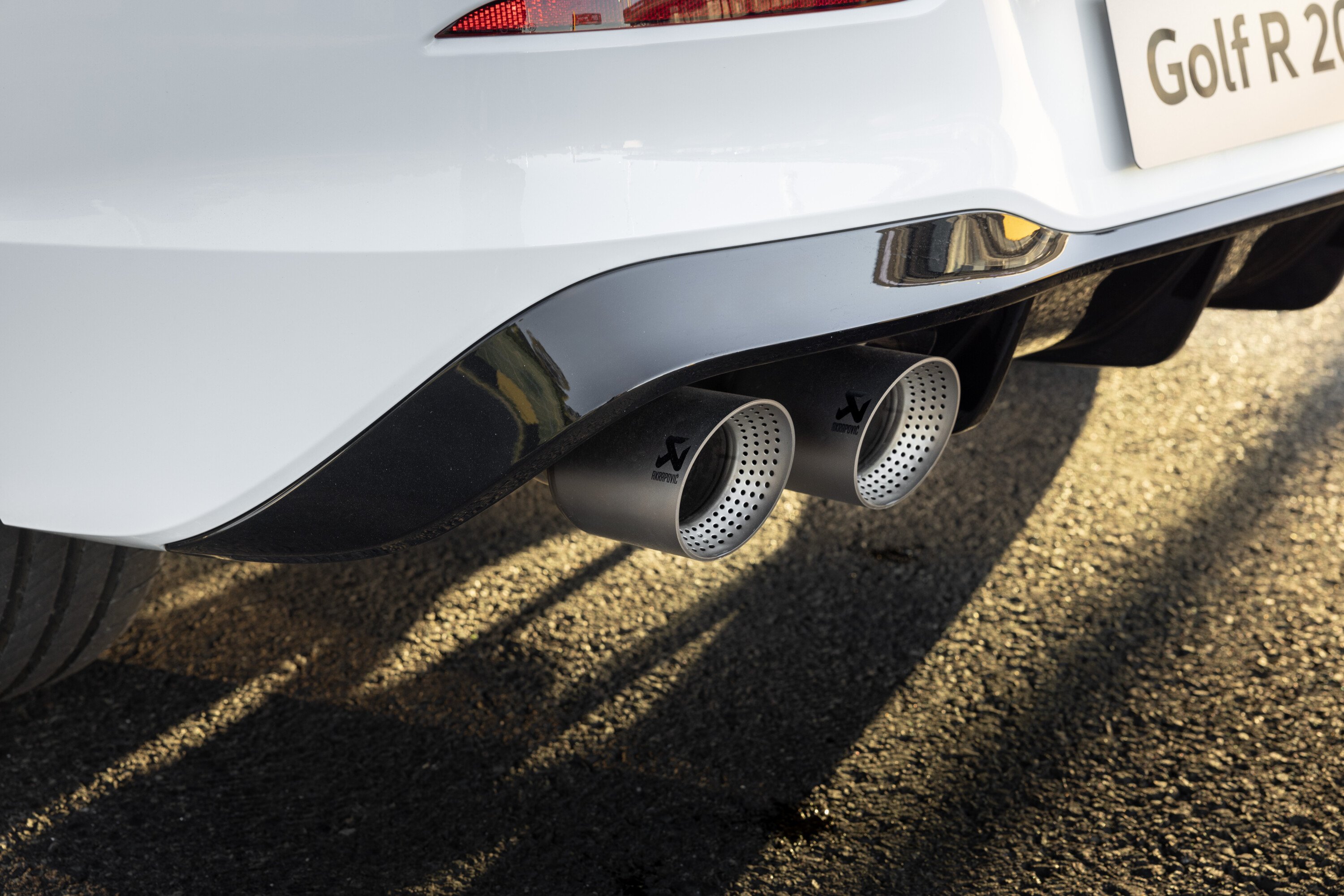
Interior comfort, space and storage
The R 20 Years’ interior will feel very familiar to current Golf R owners, save for the addition of real carbon-fibre trim and a ‘20’ badge on the piano black B-pillar.
Ahead of the driver is an excellent 10.25-inch digital display that changes to reflect what drive mode you’re in. The central 10.0-inch touchscreen that controls the infotainment system felt more responsive and intuitive than we remember – perhaps the Golf’s cabin is improving. Navigation and wireless smartphone connectivity are standard.
Ergonomically the Golf is most excellent, with the crucial controls all gathered logically around the rectangular start-stop button and stubby gear selector. The steering wheel is chunky and lovely to hold, and those extended paddles are far more satisfying than the dinky ones in a GTI.
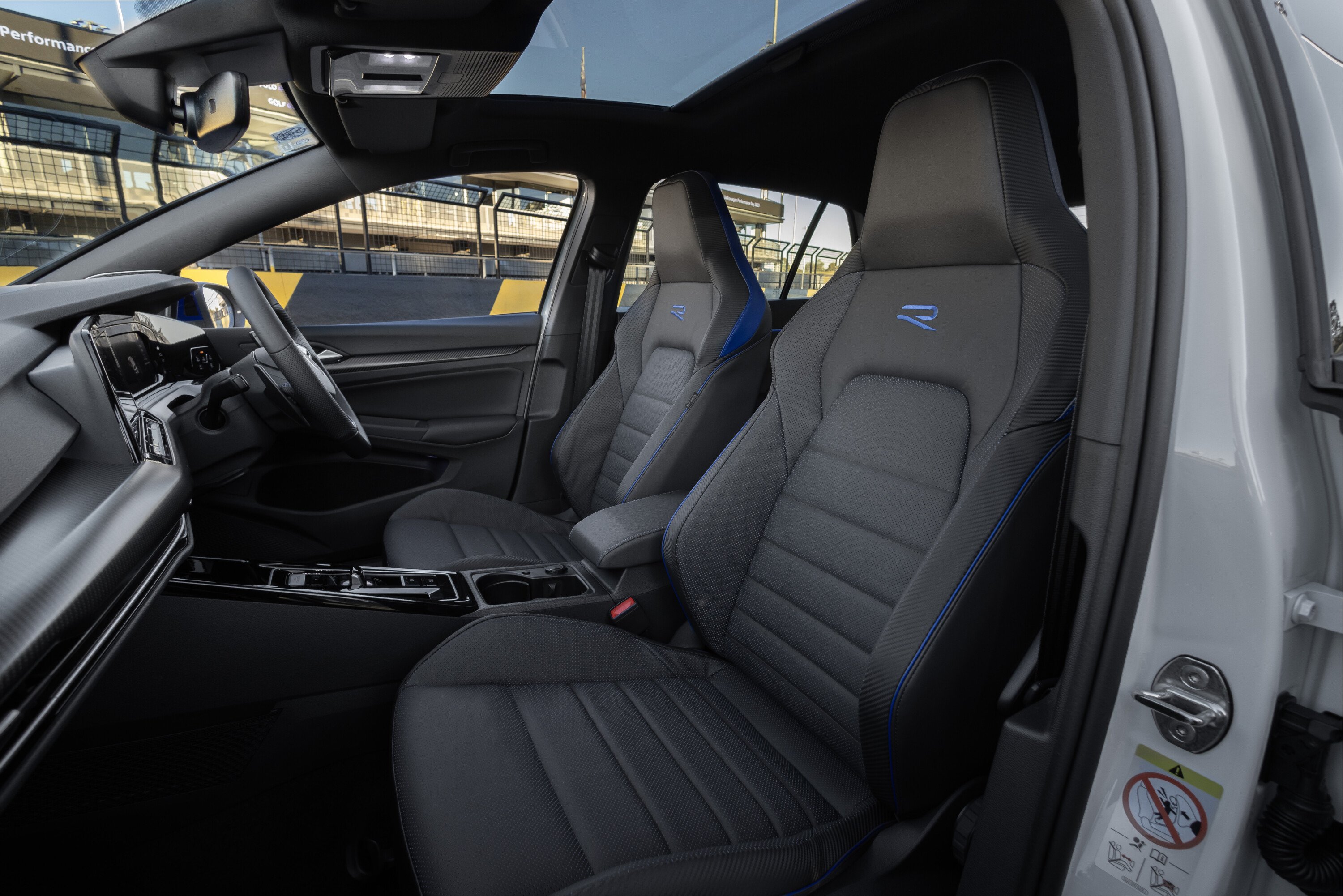
The only problem on track is the infuriating touch capacitive steering wheel. Halfway through Eastern Creek’s 165km/h first turn, I feel my hands burning up, the sweat loosening my palms’ grip on the wheel. Not ideal!
You don’t have to grip the tiller too tightly, thankfully, as the ensconcing bucket seats hold you in with great adjustment to fine-tune your driving position. They’re heated with two memory settings, so it’s a very practical machine.
In the back seat, it’s just regular Golf, and that’s great. There’s space for the family with ISOFIX and top tether points for child seats/capsules, air vents to keep the kids cool, and USB-C points to charge the iPads. A 374L boot has plenty of room for a weekend getaway.
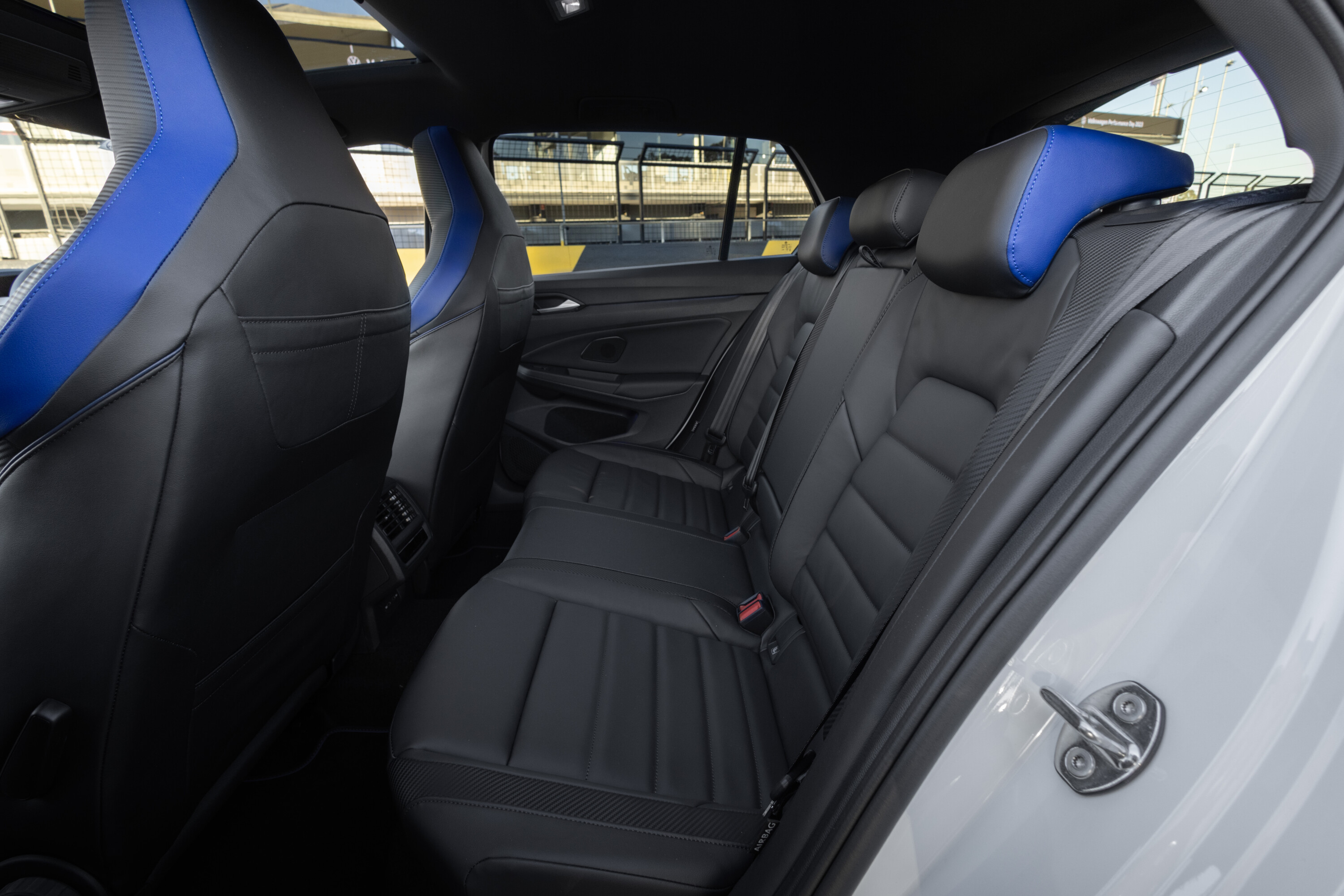
What is it like to drive on track?
The 20 Years intensifies the Golf R’s best characteristics, keeping its daily driveability while amping involvement and feel-good factor thanks to extra theatrics.
Giving the start button a long press, for example, fires the R 20 Years up with extra rev flare. Set it to Race mode using the wheel-mounted button and the exhaust sound at idle bumps a few decibels and hardens in tone. It’s augmented, of course, but the pops and crackles on the overrun – amplified through that titanium Akrapovic exhaust – are legit.
A full dose of acceleration leaving the pitlane confirms the 20 Years is typically rapid, though I’d be lying if I said my butt-dyno could tell it’s two-tenths faster to 100km/h (4.6 seconds) than the normal hatch.
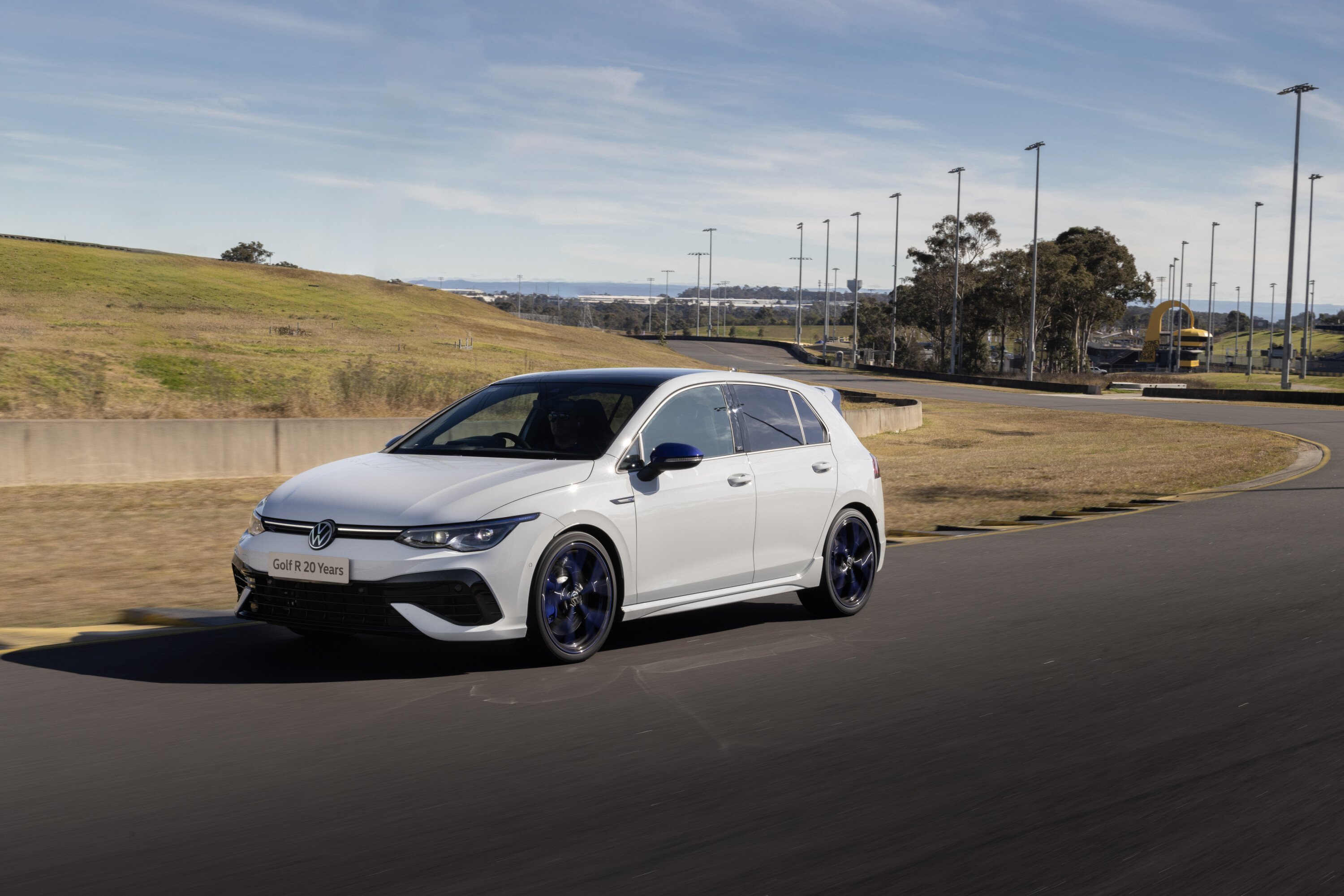
For the 20 Years, VW engineers deliberately programmed in a more aggressive shift feel at redline to amp engagement
Pulling back on the right paddle at redline thumps my helmeted head into the 20 Years’ headrest. That’s new. The seven-speed dual-clutch is usually suspiciously smooth; for the 20 Years, VW engineers deliberately programmed in a more aggressive shift feel at redline to amp engagement.
The downshifts can be a little belligerent, though. Even in Race mode with the shifter in Auto, the Golf R won’t gear down under heavy braking in the same way a Porsche PDK will, so the paddles are a must. Annoyingly, it occasionally refuses downshifts, while upshifting as you approach redline.
An upside of the R 20 Years is it keeps the butterfly valve slightly open off-throttle to maintain turbocharger speed, giving slightly quicker response than a regular Golf R. We imagine the difference is even more pronounced on a twisty road or when you need to overtake.
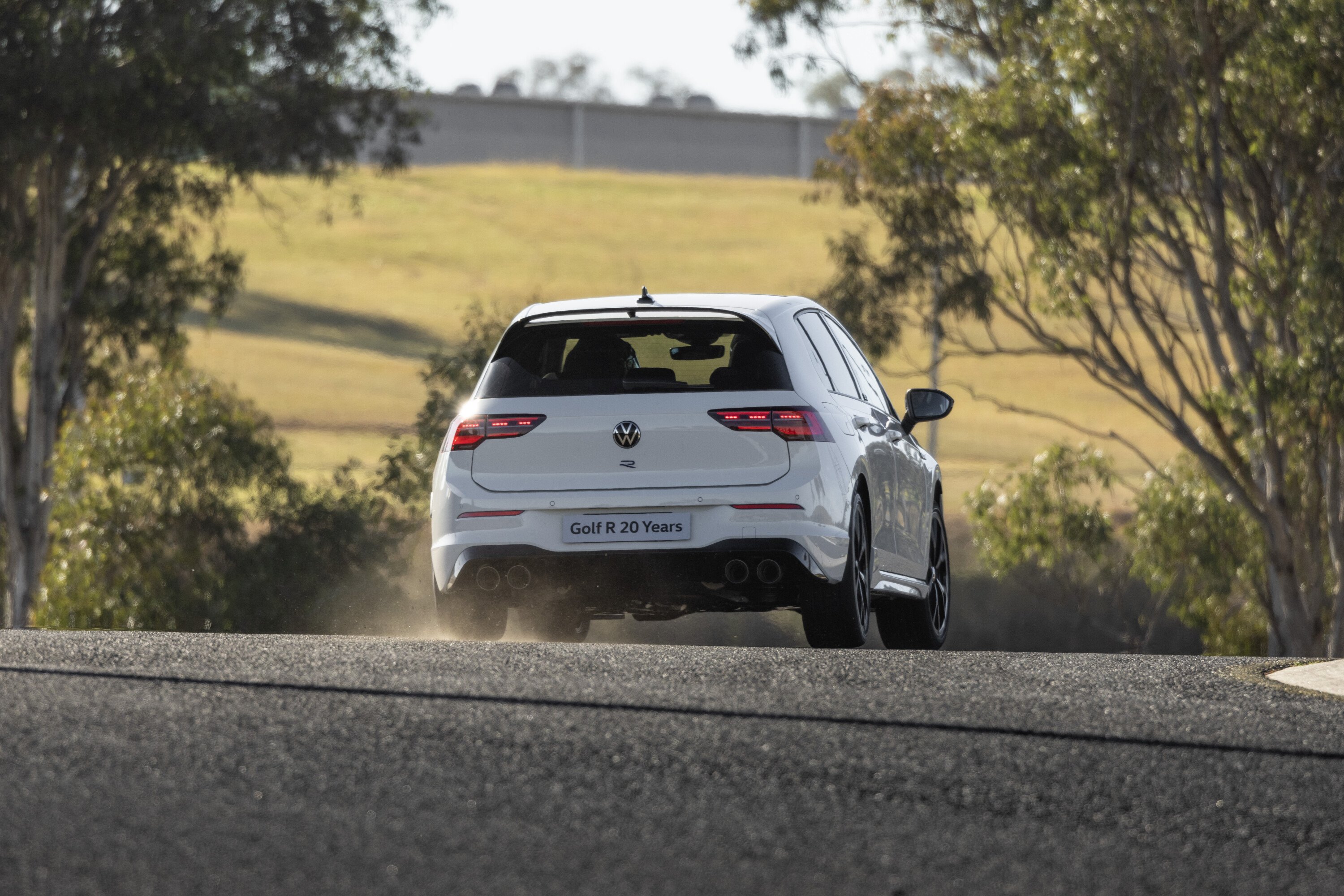
Volkswagen hasn’t made any changes to the suspension or geometry for the 20 Years, which is no bad thing.
You still get a bewildering number of damper settings (15, in fact) but for a relatively smooth track like Eastern Creek, Race mode is perfect. For bumpier circuits, such as Wakefield Park, the Nurburgring setting would be better.
The R’s progressive steering is responsive and well-weighted, if devoid of any real feedback for the driver. And while the R engineers have done their best to reduce understeer in the Mark 8, it’ll still happen if you barrel into Eastern Creek’s turn two a bit fast.
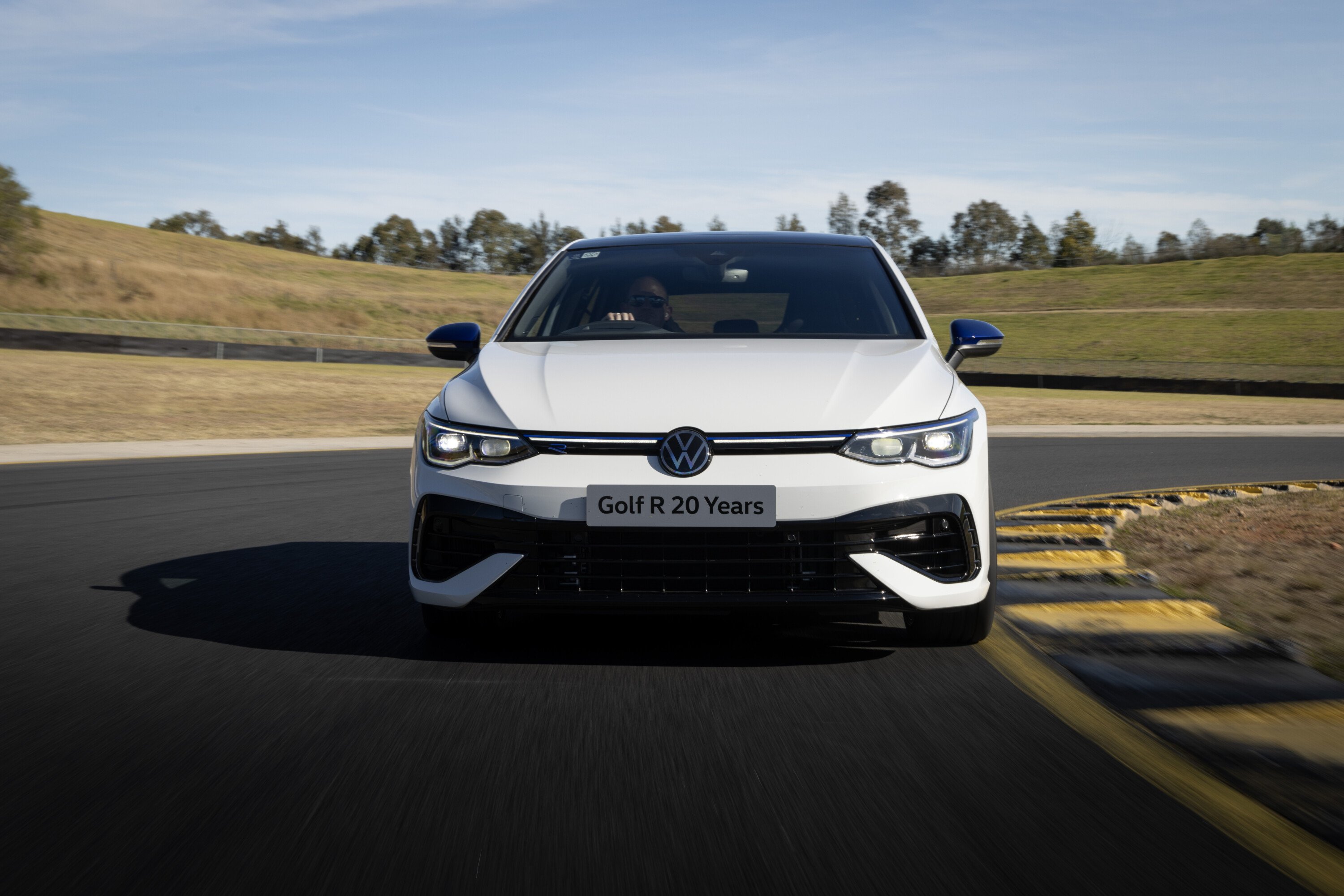
With 1556kg leaning on the nose under braking, the R is heavy for the racetrack and its right front 235/35 R19 Bridgestone S005 is the first thing to give up on the anti-clockwise North Circuit.
For corners where you build speed, such as the on-camber turn three, the R is devastating. You can just about hold the 20 Years flat here, feeling the ESC and torque-splitting rear diff do everything in their power to best split its 245-kilowatt punch between all four tyres.
Through the high-speed turns 4-5 chicane, the R remains composed, obliging some rotation under braking helping reach the apex and neutralising under power. Be patient through the last turn onto the straight and the 20 Years rockets onto 220km/h and beyond – impressive stuff for a car you can comfortably take on the school run.
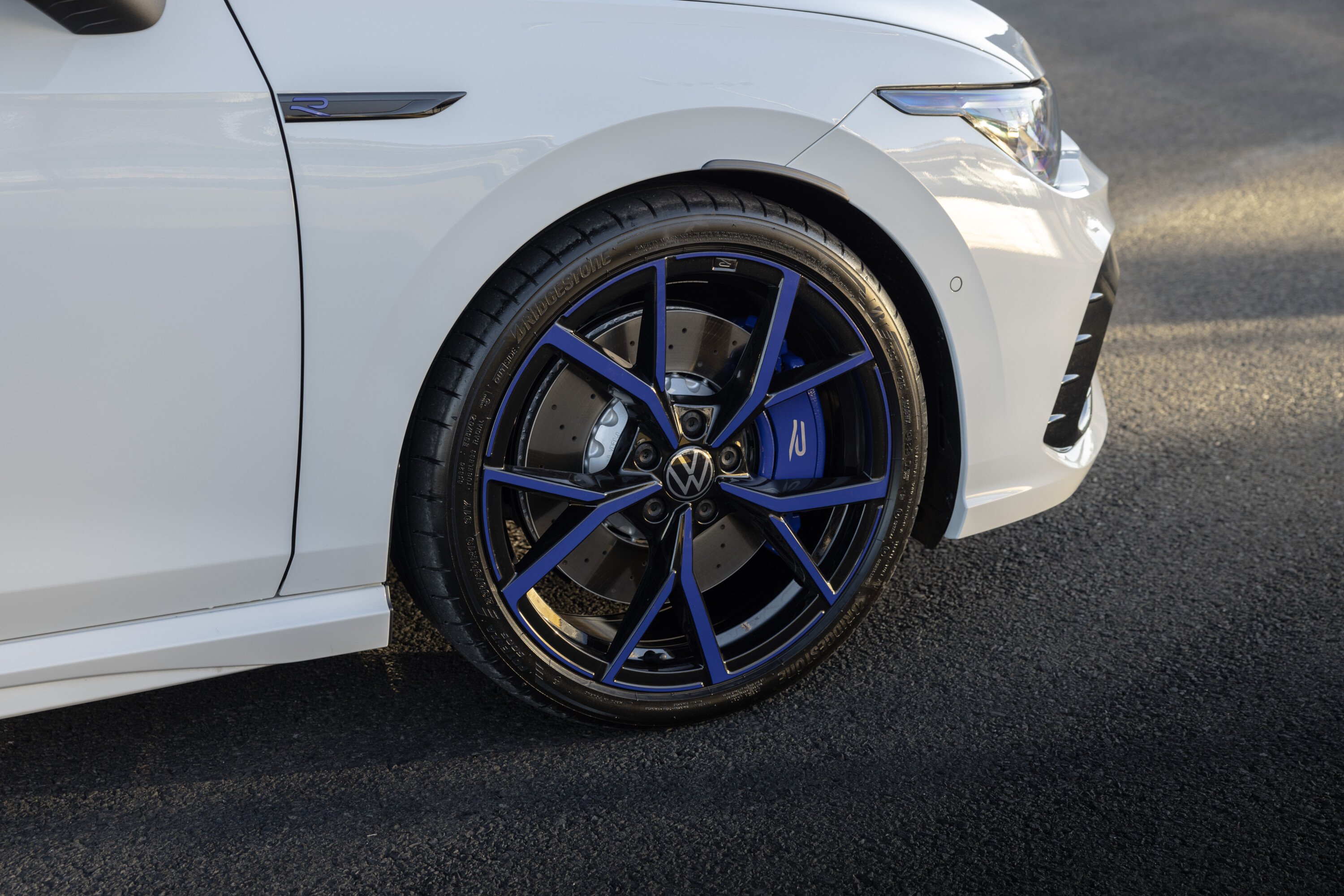
VERDICT
The fastest Golf is devastatingly quick but, as much of an improvement as it is over a Mark 7.5 for the driver, even the most powerful Golf ever doesn’t make a hugely rewarding track car.
After a few sessions, the AWD rocketship experience grows tiring as you feel the tyres and brakes weakening their resolve.
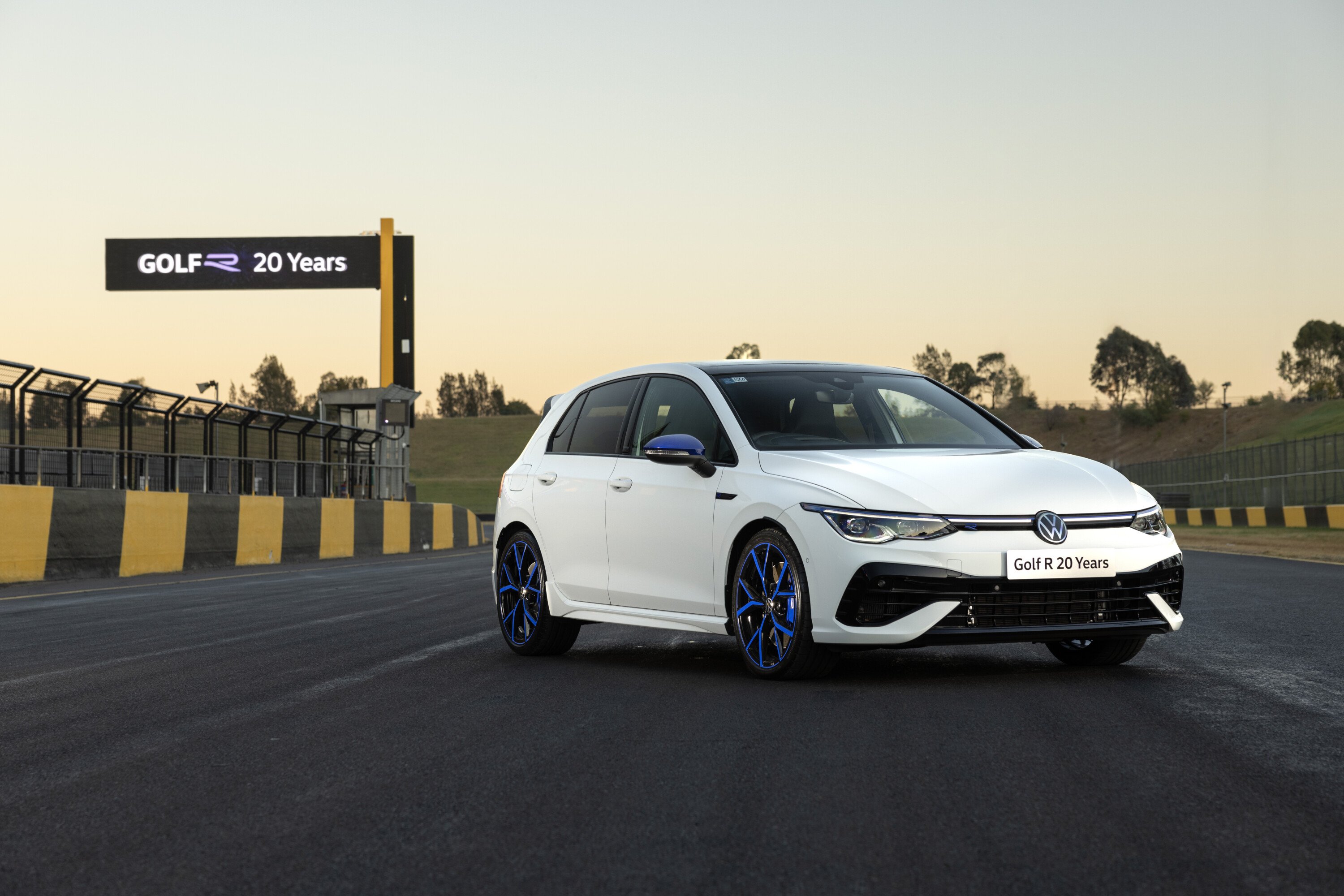
Don’t be afraid to give this car a hiding on the racetrack, just budget for replacement tyres and brakes.
The Golf R 20 Years is, instead, an extremely flattering machine; confident, composed, and rapid enough to embarrass most supercar drivers at a track day. Don’t be afraid to give this car a hiding on the racetrack, just budget for replacement tyres and brakes.
It’s a cracking way to celebrate 20 years of the R brand, though. With the 20 Years’ conspicuous visual additions and extra aural drama, all 50 examples of the most powerful Golf to date are sure to be snapped up quickly.
| 2023 Volkswagen Golf R 20 Years specifications | |
|---|---|
| Price | $77,490 before on-road costs |
| Drivetrain | |
| Engine | inline 4 cyl, 2.0-litre, DOHC, turbo-petrol |
| Layout | Front engine, transverse, AWD |
| Power | 245kW @ 5600-6500rpm |
| Torque | 420Nm @ 2100-5500rpm |
| Gearbox | 7-speed dual-clutch automatic |
| Chassis | |
| L/W/H/Wu2013B | 4290/1789/1458/2631mm |
| Track (F/R) | 1541/1516mm |
| Weight (claimed) | 1566kg |
| Boot | 374L |
| Fuel/tank | 98 RON / 55L |
| Economy (combined ADR81/02) | 7.3L/100km |
| Suspension | Front: struts, stabiliser bar. Rear: multi-link, stabiliser bar |
| Steering | Rack-assisted progressive electric power steering, 2 turns lock to lock |
| Front brakes | Ventilated and cross-drilled rotors |
| Rear brakes | Ventilated rotors |
| Tyres | Bridgestone S005 |
| Tyre size | 235/35R19 |
| Safety | |
| ANCAP rating | 5 stars (2019) |
| 0-100km/h | 4.6 seconds |
Score breakdown
Things we like
- Akrapovic exhaust and punchy shifts
- Trick clutch-pack rear diff
- Unflappable chassis
- Impressive at the local cars and coffee
Not so much
- Capacitive touch wheel buttons
- Could do with stickier tyres
- They’re probably sold out
We recommend
-
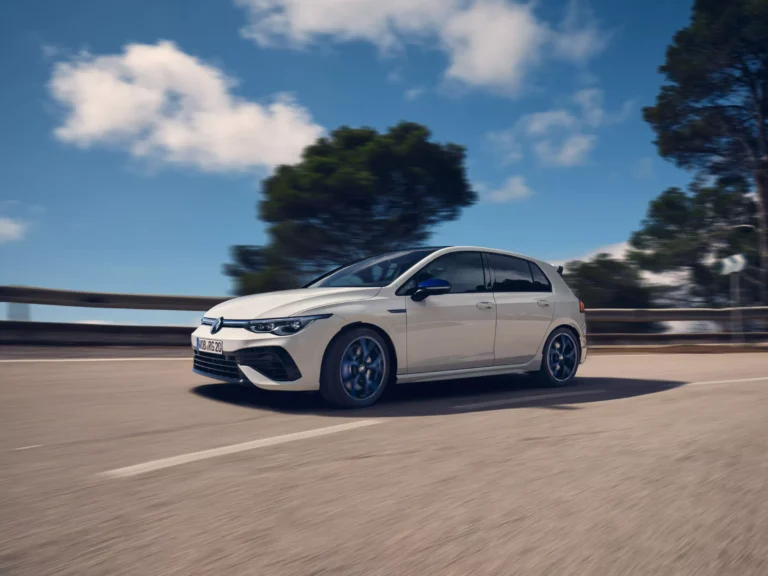 News
News2023 Volkswagen Golf R 20 Years priced from $77,490
Special edition celebrating five generations of Golf R models will be fastest Golf sold here - and arrives belatedly in July.
-
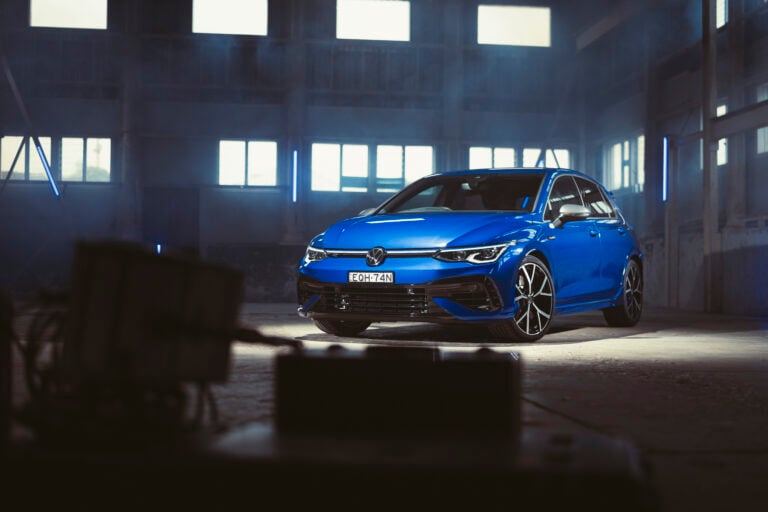 Reviews
Reviews2022 Volkswagen Golf R review: First Australian drive
Mk8 Golf brings full-fat power and a gamut of new tricks
-
 News
NewsNew car calendar 2026: All the new cars coming to Australia next year
Here’s the WhichCar by Wheels guide to all the new cars that will launch in Australia in 2026. Check back in regularly for updates...


